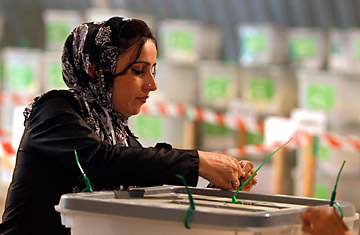
An election worker opens a ballot box during the audit and recount process at a warehouse in Kabul
No one will ever know how Afghans voted in their country's presidential elections on Aug. 20, 2009. Seven weeks after the polling, the U.N.-backed Electoral Complaints Commission (ECC) is still trying to separate fraudulent tallies from ballots. In some provinces, many more votes were counted than were cast. E.U. election monitors characterize 1.5 million votes as suspect, which would include up to one-third of the votes cast for incumbent President Hamid Karzai. Once fraud occurs on the scale of what took place in Afghanistan, it is impossible to untangle.
Afghanistan's fraudulent elections complicate President Obama's job as he weighs a recommendation from General Stanley McChrystal, his top commander there, to send as many as 40,000 additional troops to support a beefed-up counterinsurgency strategy. But for that strategy to work, the U.S. needs a credible Afghan partner, which Afghanistan's elections now seem unlikely to produce.
A war undertaken to defeat al-Qaeda is increasingly seen through the lens of these elections. In my home state of Vermont — where the National Guard is about to deploy to Afghanistan — people seek me out to ask why our soldiers should be fighting for a corrupt Afghan government clinging to power by fraud. I am quite sure the same question is being asked of political leaders in both the U.S. and Europe.
Unfortunately, I am unable to provide reassuring answers. Over the past four months, I served as the deputy head of the U.N. mission in Kabul and had a firsthand view of the fraud that plagued Afghanistan's presidential vote. Each time I proposed actions to deal with it, Kai Eide, the head of the U.N. mission in Afghanistan, overruled me. Like any good subordinate, I respected my boss's decision, but in private, I told him I thought he was making a mistake in downplaying the fraud. When the press learned of our disagreement (through no fault of ours), U.N. Secretary-General Ban Ki-moon removed me from my post. This is an account of what went wrong — and why success in Afghanistan will remain beyond our grasp until the problems I witnessed are fixed.
The Ghost Vote
Afghans perpetrated the fraud, and they are, of course, ultimately responsible for the consequences. They include the local election staff, government officials and local warlords and power brokers. Afghanistan's Independent Elections Commission (IEC), a seven-member board appointed by Karzai to supervise the elections, was anything but independent. Its head met weekly with Karzai (but not with the other candidates), and the commission consistently made decisions that benefited the Karzai campaign.
Because the elections were so critical to political stability in Afghanistan — and, therefore, prospects for the U.S.-led military mission — the U.S. and its allies needed them to go smoothly. The U.N. Security Council tasked the U.N. mission in Afghanistan to support the IEC and other Afghan institutions in the conduct of "free, fair and transparent" elections. On two occasions, I started to take action that could have reduced the risk of fraud. In July, I learned that there were 1,500 polling centers (out of a total of 7,000) sited in places either controlled by the Taliban or so insecure that no one from the IEC, the Afghan army or the Afghan police had ever visited. It was obvious that these polling centers would never open on election day. They were also perfect vehicles for fraud. Since no observer, campaign representative or voter could go to the locations, it would be easy for the election staff — on its own or in collaboration with local officials — to say voting had taken place and then report a tally.
Along with ambassadors from the U.S., NATO, the E.U. and the U.K., I urged the election commissioners and the Afghan Ministers of Defense and Interior to close down these ghost polling centers. Serving a President who was to benefit from the fraud, the Afghan ministers complained about my approach to my boss, Eide, and he ordered me to stop. On election day, these ghost polling centers produced hundreds of thousands of fraudulent votes for Karzai. (After controversy erupted over my dismissal, the U.N. told some reporters that I wanted to disenfranchise voters by closing polling centers; this was absurd. The only ones I wanted taken off the books were ones that had never opened.)
